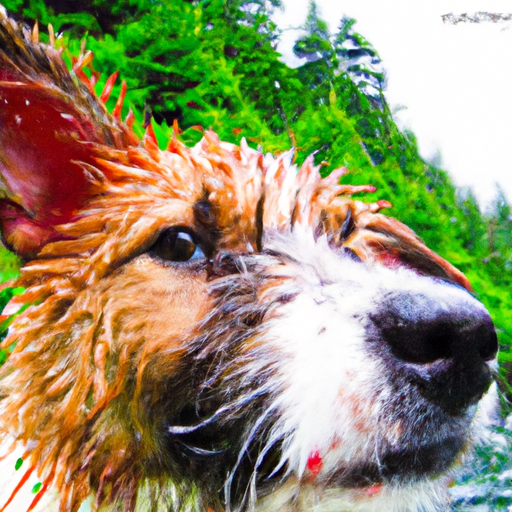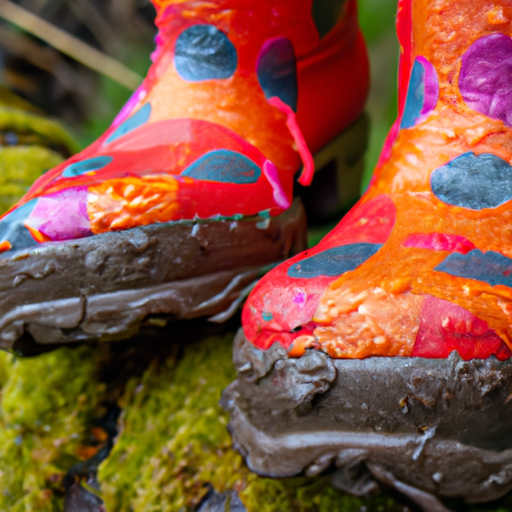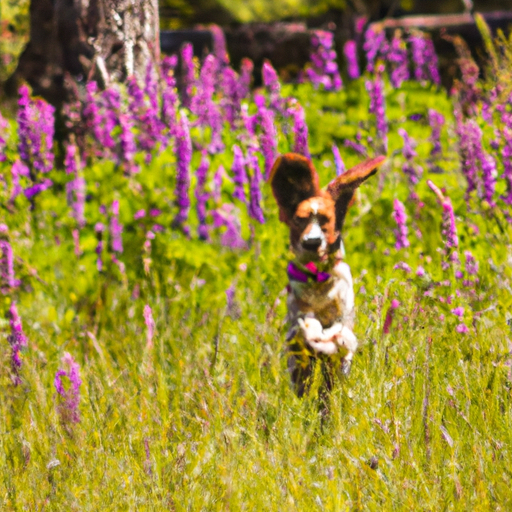Are you a proud new puppy owner? Congratulations! Get ready for an exciting journey filled with joy, cuddles, and the cutest moments. In this article, we will explore the important milestones that your furry friend will go through during their development. From their first steps to their teething phase and everything in between, we will guide you on what to expect at each stage. So, grab a cozy spot, snuggle up with your pup, and let's embark on this incredible adventure together.
Birth to 2 Weeks
Appearance and Behavior
During the first two weeks of a puppy's life, their appearance and behavior are quite different compared to when they are fully grown. At this stage, puppies are blind, deaf, and completely dependent on their mother for nourishment and care. They are tiny and delicate, with their eyes and ears still closed. Most of their time is spent sleeping or nursing, as they are not yet able to walk or explore their surroundings. Their puppy coat is typically very soft and may come in a variety of colors, depending on their breed.
Senses
While puppies are born with their eyes and ears closed, their sense of smell is fully functioning from birth. This is vital, as it helps them locate their mother and find their source of food. The sense of touch is also well-developed, and the warm contact with their mother and littermates provides comfort and security. However, it's important to note that their sense of taste is not fully developed during this period, as they solely rely on their mother's milk for nourishment.
Feeding and Care
During the first two weeks, puppies rely solely on their mother's milk for nourishment. It provides them with essential nutrients and antibodies that help build their immune system. At this stage, it is crucial to ensure that the mother dog receives a high-quality diet to produce nutritious milk for her puppies. As a responsible owner, it's important to provide a comfortable and quiet space for the mother and her litter, ensuring that they are not disturbed. It's also essential to keep their area clean to prevent any potential infections.
Motor Skills
At birth, puppies are not yet able to walk or even crawl. Their muscles are underdeveloped, and they primarily rely on the gentle stimulation from their mother's licking to assist with bodily functions. As they near the two-week mark, puppies will begin to gain some muscle strength and coordination, which allows them to start attempting to stand and take a few wobbly steps. However, their movements are still unsteady and require support from their mother and littermates. It is during this period that their motor skills start to develop, setting the foundation for future physical abilities.
Socialization
During the first two weeks of a puppy's life, their socialization mainly revolves around their mother and littermates. They learn crucial social skills through interactions with their siblings, such as bite inhibition and appropriate play behavior. Puppies also begin to recognize their mother's scent and voice, fostering a bond that will play a significant role in their future development. It's important to provide a calm and safe environment for the mother and her litter to promote healthy socialization during this period.
2 to 4 Weeks
Physical Changes
Between 2 to 4 weeks of age, puppies undergo several physical changes that are key indicators of their development. Their eyes and ears gradually open, allowing them to perceive the world around them. Initially, their vision and hearing are still developing, but they are now able to see and hear their surroundings to a certain extent. Additionally, their teeth start to emerge, with tiny, needle-like teeth breaking through their gums. These physical changes mark an exciting milestone in a puppy's life and lay the foundation for further growth and exploration.
Growth and Weight Gain
During this period, puppies experience rapid growth and weight gain. They will visibly become larger and more robust as they consume their mother's milk. It's essential to monitor their weight gain regularly to ensure they are receiving adequate nutrition. If there are any concerns about their growth or weight, consulting a veterinarian is highly recommended. Proper nutrition and a healthy growth rate are essential in ensuring puppies develop into strong and healthy adult dogs.
Eyes and Ears
Between the age of 2 to 4 weeks, puppies' eyes and ears start to open, allowing them to perceive the world in a whole new way. Initially, their vision and hearing may be limited, but they will progressively improve over time. Puppies will start to react to sounds and movements, exhibiting curiosity and heightened awareness of their environment. It's important to provide a safe and stimulating space for them to explore, while also being mindful of their vulnerability and potential sensitivity to loud noises.
Emergence of Teeth
At around 2 to 3 weeks, puppies begin the process of teething. This means that their baby teeth, or milk teeth, start to emerge. Initially, their teeth will be small and sharp, resembling tiny needles. As they continue to grow, the puppy's jaw and teeth become stronger. It's essential to provide appropriate chew toys to help soothe their teething discomfort and redirect their chewing behavior away from inappropriate items. Regularly inspecting and cleaning their teeth as part of their oral hygiene routine is also essential for their long-term dental health.
Increased Mobility
Between 2 to 4 weeks, puppies experience a significant increase in their mobility and physical abilities. They will go from wobbly attempts at walking to walking more confidently and even attempting to run. They also start to explore their surroundings, becoming more curious about their environment. Encouraging this exploration in a safe and controlled manner is essential for their development. Providing a puppy-proofed area where they can safely play and explore will help them build confidence and coordination.
4 to 8 Weeks
Weaning Process
Around 4 weeks of age, the weaning process begins. This is the gradual transition from solely relying on their mother's milk to consuming solid food. During this period, puppies start to show interest in their mother's food, and their mother starts to naturally reduce their nursing sessions. It is important to introduce a high-quality puppy food specifically designed to meet their nutritional needs during this transition. It's also crucial to consult with a veterinarian to ensure a smooth weaning process and proper nutrition for the growing puppies.
Introduction to Solid Food
As the weaning process begins, puppies are gradually introduced to solid food. Initially, it's best to provide a milk replacer mixed with puppy-specific wet food to create a soft and easily digestible consistency. Puppies may start by tentatively tasting the food, licking and possibly even chewing on it. It may take a few days for them to fully adapt to the new texture and taste. As they progress, the food can be gradually thickened and eventually transitioned to solid kibble. Ensuring they have access to fresh water at all times is also important during this stage.
Potty Training
Between 4 to 8 weeks, puppies start to develop more control over their bladder and bowel movements. This is the stage where early potty training begins. Puppies learn to associate specific areas or surfaces as appropriate places to eliminate. Establishing a designated indoor or outdoor potty area, and consistently taking them to that spot after meals and naps, helps reinforce this behavior. Positive reinforcement, such as praise and treats, plays a crucial role in teaching puppies where and when to relieve themselves.
Exploration and Play
Between 4 to 8 weeks, puppies become more adventurous and curious about their environment. They will actively seek out new experiences, objects, and playmates within their litter. It's essential to provide them with a safe and stimulating environment where they can engage in exploratory play. Offering a variety of puppy-safe toys, textures, and surfaces helps stimulate their senses and encourages physical and mental development. This period of exploration and play is vital for fostering their cognitive abilities and social skills.
Early Training
During the 4 to 8-week period, puppies start to become more receptive to basic training commands. Simple commands such as “sit,” “come,” and “stay” can be introduced using positive reinforcement techniques. Consistency, patience, and rewards are key components of effective early training. By laying a solid foundation of basic manners and obedience, puppies are better prepared for further training as they grow older. Early training helps establish a strong bond between the owner and the puppy, fostering a positive and cooperative relationship.
8 to 12 Weeks
Continued Growth
Between 8 to 12 weeks, puppies continue to experience steady growth and development. They will noticeably become larger and more proportionate as their skeletal structure continues to develop. Proper nutrition, regular exercise, and routine veterinary check-ups are essential during this period to support healthy growth and ensure any potential issues are addressed promptly. Monitoring their weight, size, and overall physical condition is crucial in ensuring they are on the right track for a healthy adulthood.
Teething Challenges
Around 8 to 12 weeks, puppies enter another phase of teething as their baby teeth start to be replaced by their adult teeth. This process can be uncomfortable and may cause puppies to chew on various objects to alleviate the teething pain. It's important to provide appropriate chew toys specifically designed for teething puppies to redirect their chewing behavior. Regularly inspecting their mouth and teeth for any abnormalities or issues is recommended to maintain their dental hygiene during this period.
Basic Commands
Between 8 to 12 weeks, puppies are ready to learn more advanced basic commands. Building upon the foundation established during early training, owners can introduce commands such as “lie down,” “leave it,” and “drop it.” Consistency and positive reinforcement remain crucial in their training. Short and engaging training sessions that incorporate play and rewards help keep the puppies motivated and focused. Positive experiences during training enhance their overall confidence and willingness to learn, creating a positive and long-lasting training experience.
Housebreaking
During the 8 to 12-week period, puppies typically start to show progress in their housebreaking skills. With more control over their bladder and bowel movements, they can begin to develop a routine. Establishing a consistent schedule for feeding, potty breaks, and playtime aids in their housebreaking process. Continually reinforcing positive behaviors, such as eliminating in the designated area and providing ample praise and rewards, helps solidify their understanding of where and when to relieve themselves. Consistency and patience are key in successful housebreaking.
Socializing with Other Dogs
Between 8 to 12 weeks, puppies become increasingly social and receptive to interactions with other dogs. It's important to expose them to a variety of positive social experiences with well-mannered and vaccinated dogs. Controlled playdates or puppy classes provide opportunities for them to learn appropriate social behaviors. These interactions help puppies develop important social skills, build confidence, and understand the dynamics of canine communication. Socializing with other dogs fosters a well-rounded and sociable adult dog.
12 to 16 Weeks
Adult Teeth Development
Between 12 to 16 weeks, puppies' baby teeth should have fully transitioned to their adult teeth. This is a crucial period for their dental health, as their adult teeth play a vital role in their lifelong oral hygiene. Regularly inspecting their teeth and gums is essential, as any signs of dental issues, such as misalignment or overcrowding, should be addressed promptly. Implementing a daily dental care routine, such as brushing their teeth with vet-approved toothpaste, helps maintain their oral health and prevent potential dental problems.
Development of Adult Coat
Around 12 to 16 weeks, puppies' soft and fuzzy puppy coat gradually gives way to their adult coat. The texture, color, and pattern of their adult coat become more apparent during this stage. Depending on the breed, the coloration and length of the coat may change as the puppy matures. Regular grooming, including brushing and bathing, helps keep their coat healthy and free from mats or tangles. If necessary, consulting a professional groomer can provide guidance on breed-specific grooming needs.
Mental and Physical Exercise
Between 12 to 16 weeks, puppies require mental and physical exercise to support their growing bodies and minds. Engaging in age-appropriate activities, such as puzzle toys, interactive play, and short training sessions, helps stimulate their mental faculties. Regular physical exercise, such as short walks or playtime, keeps their bodies active and aids in muscle development. It's important to strike a balance between mental and physical stimulation to prevent boredom and potential destructive behaviors.
Advanced Training
Around 12 to 16 weeks, puppies are ready to expand their training to more complex commands and behaviors. Advanced training may involve tasks such as leash manners, recall in distracting environments, and more intricate tricks. Consistency, positive reinforcement, and patience are vital during this stage. Building upon the foundation established in earlier training phases, advanced training promotes mental stimulation, fine-tunes their obedience skills, and cultivates a deeper bond between the owner and the dog.
Leash Training
Between 12 to 16 weeks, puppies can begin their leash training journey. Introducing them to a leash and collar at an early stage helps familiarize them with these essential walking tools. Initially, short and controlled walks in a familiar environment help them adjust to the sensation of being on a leash. Gradually, longer walks in varied surroundings aid in their exposure to different stimuli. Positive reinforcement, such as treats and praise, helps make the leash training experience positive and enjoyable for both the owner and the puppy.
4 to 6 Months
Sexual Maturity
Between 4 to 6 months, puppies typically enter their sexual maturity phase. For male dogs, this is the period when they begin to exhibit signs of reaching sexual maturity, which may include mounting and marking behaviors. Female dogs may experience their first heat cycle during this time. Responsible pet owners should consider spaying or neutering their puppies to prevent unwanted pregnancies and potential health issues associated with intact animals. Consulting with a veterinarian regarding the appropriate timing for spaying or neutering is recommended.
Spaying or Neutering
Between 4 to 6 months, many pet owners opt to spay or neuter their puppies, which involves surgically sterilizing them. Spaying refers to the removal of the female's reproductive organs, while neutering refers to the removal of the male's testicles. Spaying or neutering offers several benefits, including population control, prevention of certain cancers, and reduction of certain behavioral issues. However, it's important to discuss the procedure with a veterinarian to determine the optimal timing and any potential risks associated with the surgery.
Preventing Unwanted Behaviors
During the 4 to 6-month stage, puppies may start to test boundaries and exhibit certain unwanted behaviors. This can include chewing on household items, jumping on people, or excessive barking. Consistency and positive reinforcement training methods are key in preventing and redirecting these behaviors. Providing appropriate chew toys, teaching alternative greetings, and utilizing positive training techniques help them develop appropriate behavior patterns. Addressing unwanted behaviors early on ensures a well-behaved and happy adult dog.
Further Socialization
Between 4 to 6 months, puppies benefit from continued socialization experiences. Introducing them to new people, environments, and animals helps reinforce their social skills and build confidence. Exposure to various stimuli, such as different sounds, surfaces, and objects, helps them navigate the world with ease. Enrolling them in puppy socialization classes or arranging playdates with well-behaved dogs creates positive interactions and strengthens their ability to adapt to new situations. A well-socialized dog is generally more resilient and adaptable to various environments and experiences.
Obedience Training
Between 4 to 6 months, puppies are ready to further refine their obedience training. Building upon their basic commands, owners can introduce more complex obedience exercises involving distractions and longer duration. Consistency and positive reinforcement remain crucial in their training, with the addition of gradual increases in expectations. Utilizing reward-based training methods helps reinforce desired behaviors and fosters a cooperative relationship between the owner and the puppy. Positive training experiences create a foundation for lifelong obedience and communication.
6 to 12 Months
Establishing Routines
Between 6 to 12 months, puppies benefit from consistent routines to establish a sense of structure and predictability in their daily lives. Establishing a routine for feeding, exercise, training sessions, and rest helps them feel secure and reduces potential anxiety. Consistency in routines aids in their overall development and facilitates a smooth transition into adulthood. Planning their days based on their needs also promotes balance and ensures their physical and mental well-being.
Final Growth Spurt
Between 6 to 12 months, some larger breeds may experience a final growth spurt. This growth phase may result in visible changes in their size and body proportions. Proper nutrition and regular veterinary check-ups are important during this stage to support healthy growth and development. It's essential to provide a diet specifically formulated for puppies or young adults of their size and breed. Monitoring their weight, size, and overall growth pattern enables owners to make any necessary adjustments to ensure a healthy and proportionate adulthood.
Full Adult Coat
Between 6 to 12 months, puppies usually develop their full adult coat. This is especially noticeable in long-haired breeds, where the transition from a puppy coat to an adult coat is more apparent. Brushing their coat regularly helps maintain its health, prevents matting or tangling, and promotes their natural oils for a shiny and lustrous appearance. The grooming needs may vary depending on the breed, so seeking guidance from a professional groomer is advised to establish a proper grooming routine.
Fine-tuning Training
Between 6 to 12 months, puppies can further refine their training skills and manners. Advanced obedience commands, such as “stay” and “heel,” can be incorporated into their training sessions. Fine-tuning their obedience training helps ensure they are well-behaved and responsive in various situations. Positive reinforcement techniques combined with consistent training sessions strengthen their bond with their owners and instill good behavior patterns that will last throughout their adult lives.
Health Check-ups
Between 6 to 12 months, regular veterinary check-ups are crucial to monitor the puppy's overall health and ensure they are growing as expected. During these visits, the veterinarian will conduct a thorough examination, may administer necessary vaccinations, and address any concerns or questions the owner may have. Regular check-ups help detect any potential health issues early on, allowing for timely intervention and treatment. Maintaining a good relationship with a trusted veterinarian ensures the puppy receives the best possible care for their well-being.
1 Year and Beyond
Gradual Transition to Adult Diet
Around 1 year of age, most puppies are ready for a gradual transition from puppy food to adult dog food. The transition should be done gradually over a span of a week or two to prevent any digestive upset. Adult dog food is formulated to meet the nutritional needs of mature dogs and should be chosen based on the individual dog's size, breed, and any specific dietary requirements. Consulting with a veterinarian or a canine nutritionist is recommended to ensure a smooth transition and proper adult nutrition.
Adulthood Behavior
By the age of 1 year, puppies are considered adults, and their behavior should start to reflect this transition. They should have gained more control over their impulses and exhibit improved self-control. They should become more settled and less prone to erratic or hyperactive behavior. However, it's important to remember that every dog is unique, and individual behavior may vary. Continued consistency in training, socialization, and mental stimulation helps maintain desired adult behaviors and prevents potential behavioral issues.
Continued Training and Enrichment
Beyond 1 year of age, dogs can continue to learn and benefit from ongoing training and enrichment activities. Mental stimulation through puzzle toys, obedience training sessions, and interactive games helps keep their minds sharp and engaged. Physical exercise also remains important for maintaining their health and well-being. Varying the types of activities and introducing new challenges keeps the dog mentally and physically stimulated, preventing boredom and potential behavior problems.
Annual Vaccinations and Vet Visits
Once a dog reaches adulthood, it's important to maintain their vaccination schedule and regular veterinary check-ups to ensure their continued health. Annual vaccinations help protect against common canine diseases and prevent the spread of infectious illnesses. Routine check-ups allow the veterinarian to assess the dog's overall health, address any concerns, and perform necessary screenings. Vaccinations and regular veterinary care are key components of responsible dog ownership and contribute to the dog's longevity and well-being.
Monitoring Overall Health
Throughout a dog's life, it's essential to monitor their overall health and be aware of any changes or signs of illness. Regularly checking their weight, coat condition, appetite, and energy levels helps detect any potential health issues early on. Observing their behavior, bowel movements, and urination patterns also provides valuable insight into their well-being. Being proactive and seeking veterinary advice if any concerns arise ensures prompt intervention and appropriate treatment, contributing to the dog's long and healthy life.
Socialization and Training
Early Socialization
Early socialization is crucial for puppies to become well-adjusted adult dogs. The period from birth to about 4 months is considered the critical socialization period. During this time, it's important to expose puppies to a wide variety of people, animals, and environments. Positive experiences with different stimuli help puppies become more resilient, adaptable, and less fearful in new situations. Regular socialization opportunities, such as puppy classes, playdates with other dogs, and outings to different environments, foster healthy social development and prevent potential behavior issues.
Positive Reinforcement Training
Positive reinforcement training is an effective and humane approach to training dogs. This training method involves rewarding desired behaviors with praise, treats, or play, while ignoring or redirecting undesired behaviors. Positive reinforcement techniques create a positive association with training, enhance the dog's motivation to learn, and strengthen the bond between the owner and the dog. Training sessions should be short, engaging, and consistent to help the dog understand what is expected and to reinforce positive behaviors.
House Training
House training, or potty training, is an essential aspect of a puppy's early training. Establishing a routine and consistency is key to successful house training. Taking the puppy outside to a designated potty area after meals, playtime, and naps helps them associate that spot with relieving themselves. Offering praise, treats, or verbal cues when they eliminate in the appropriate area reinforces the desired behavior. Consistency, patience, and positive reinforcement are vital in house training and ensure the development of good bathroom habits.
Basic Commands
Teaching basic commands, such as “sit,” “stay,” and “come,” is fundamental in a dog's training journey. Starting with simple commands and gradually increasing the level of difficulty helps puppies learn and build on their training foundation. Positive reinforcement techniques, such as treats, praise, or play, help motivate the puppy to follow commands and reinforces positive behavior. Consistency, positive reinforcement, and short, engaging training sessions contribute to successful basic command training and establish a strong communication between the owner and the dog.
Leash Training
Leash training is an essential skill for puppies to learn. Introducing a leash gradually and positively helps the puppy become comfortable with its presence. Initially, short walks in a controlled environment, such as the backyard, allows the dog to adjust to the sensation of being on a leash. As their confidence grows, longer walks in different surroundings provide valuable exposure to various stimuli. Consistency, positive reinforcement, and patience are crucial in teaching leash manners. Building a positive association with the leash through reward-based training helps establish a pleasant walking experience for both the owner and the dog.
Health and Care
Vaccination Schedule
Proper vaccination is essential in maintaining a dog's health and preventing the spread of infectious diseases. Vaccinations typically begin when a puppy is around 6 to 8 weeks old. The initial vaccination series includes core vaccines, such as distemper, parvovirus, hepatitis, and rabies. Booster shots are needed at specific intervals, typically every 3 to 4 weeks, until the puppy is around 16 to 20 weeks old. Following the initial vaccination series, annual or triennial booster shots are required to ensure continued protection. Consulting with a veterinarian helps establish an appropriate vaccination schedule for each individual dog.
Deworming
Deworming is a crucial aspect of a puppy's healthcare routine. Puppies can acquire intestinal parasites, such as roundworms or hookworms, from their mother or the environment. Deworming medication helps eliminate and prevent the infestation of these parasites. The frequency of deworming depends on factors such as the puppy's age, current health, and risk of exposure. Veterinarians typically recommend deworming starting at around 2 weeks old, with subsequent treatments every 2 to 4 weeks until the puppy is around 4 to 6 months old. Following a deworming schedule helps ensure the puppy's gastrointestinal health and overall well-being.
Flea and Tick Prevention
Fleas and ticks are common external parasites that can infest dogs and cause discomfort and potential health issues. Preventive measures, such as flea and tick preventives, are essential in protecting dogs from these pests. Consultation with a veterinarian is recommended to determine the appropriate flea and tick prevention products based on the dog's age, size, and lifestyle. Regular application of flea and tick preventive treatments, combined with maintaining a clean living environment, provides the best defense against fleas and ticks and prevents potential infestations.
Oral Hygiene
Maintaining good oral hygiene is crucial in preventing dental issues and promoting overall health in dogs. Regular brushing of the dog's teeth with a toothbrush and toothpaste specifically formulated for dogs helps remove plaque and prevent tartar buildup. Establishing a daily toothbrushing routine from a young age helps familiarize the dog with the process and ensures continued acceptance of dental care. Providing dental chews, dental rinses, or water additives can also aid in promoting oral hygiene. Regular dental check-ups with a veterinarian are recommended to check for any dental issues and to perform professional cleanings if needed.
Grooming Needs
The grooming needs of dogs vary depending on factors such as the breed, coat type, and individual characteristics. Regular grooming helps maintain the dog's coat health, prevents matting, and serves as an opportunity to inspect the dog's overall condition. Grooming tasks may include brushing, bathing, nail trimming, ear cleaning, and dental care. Establishing a grooming routine from a young age helps the dog become accustomed to the process and ensures their well-being. Consulting with a professional groomer or breed-specific resources provides guidance on the specific grooming needs of different breeds.






